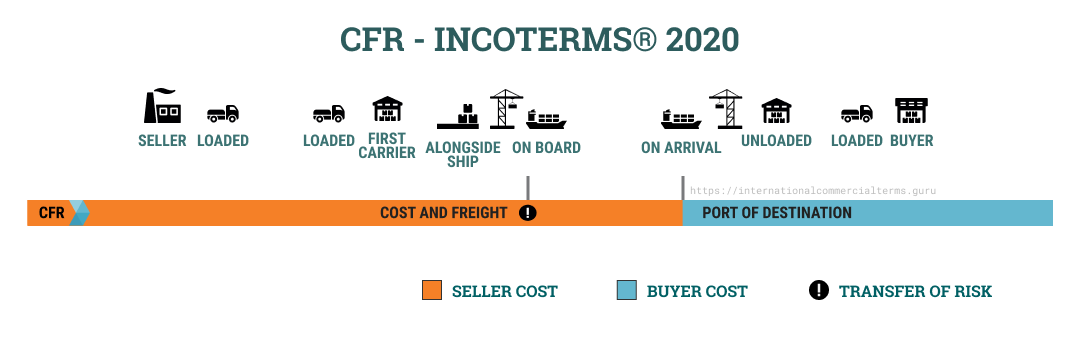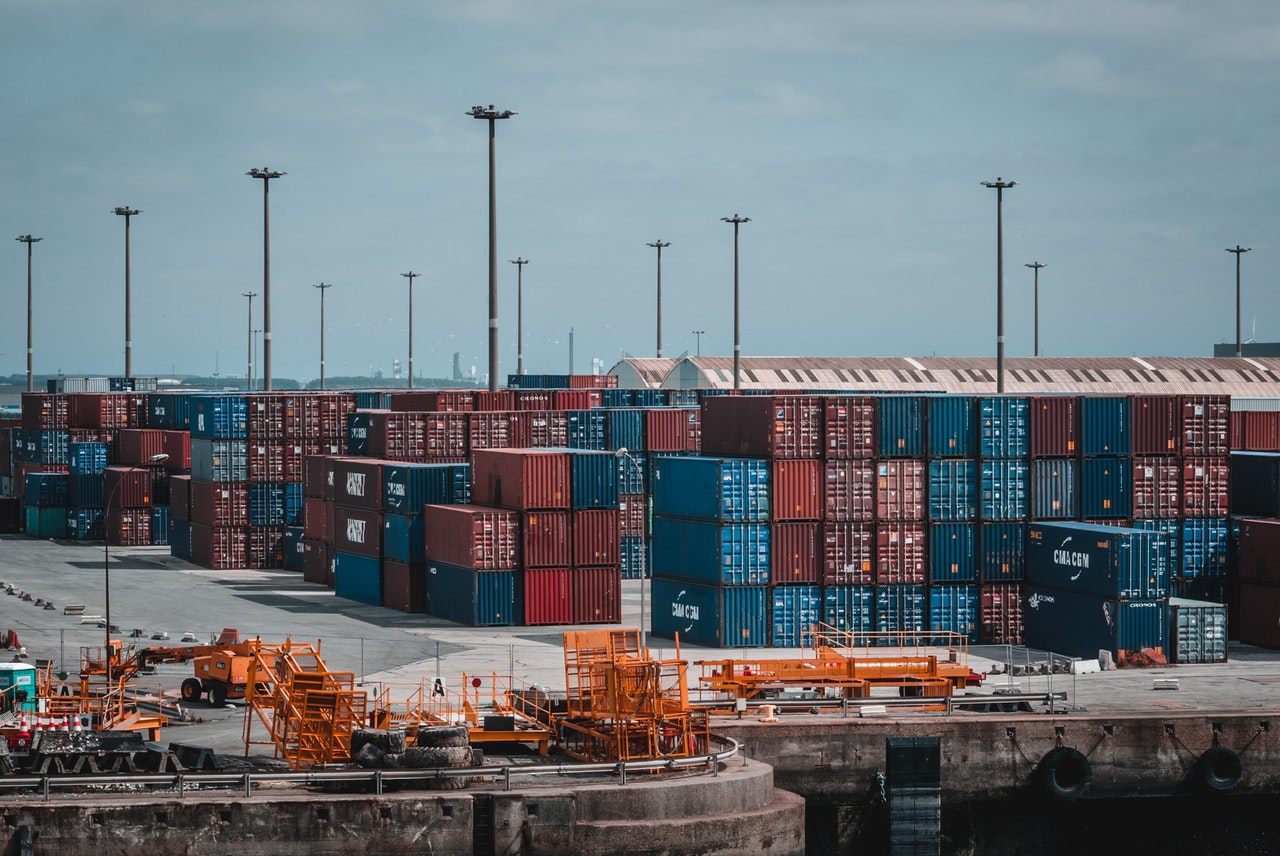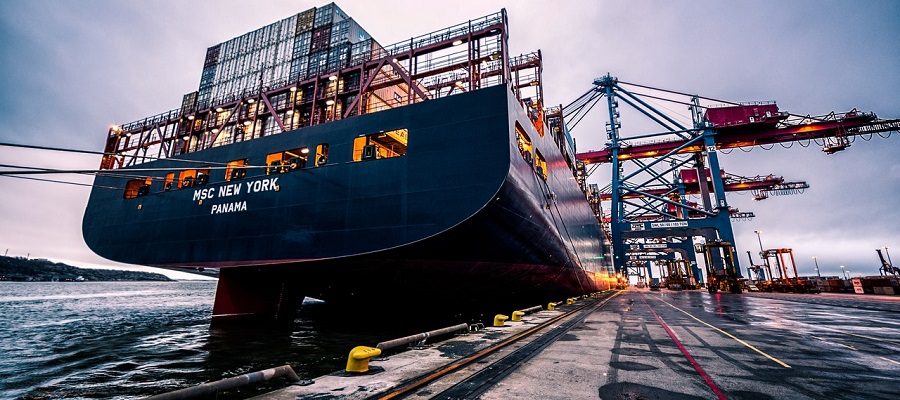In the INCOTERMS® 2020, which have been in force since January 1, 2020, there are 11 clauses that can be divided into four groups. Within the groups, the clauses have the same initial letter. These are based on the obligations of the seller, or the buyer. In addition to the division of obligations between the parties, the choice of the appropriate clause also depends on the chosen means of transport, the goods to be transported and the interests in the individual case.
EXW - EX WORKS (...named place)
"Ex Works" means that the Seller makes the goods available to the Buyer at its premises or at another named place, e.g. factory, plant, warehouse. The seller does not have to load the goods onto a collecting means of transport, nor does he have to clear the goods for export, should this be necessary.

"Ex Works" explained - Source: guidedimports.com
It is important to designate the place of delivery as precisely as possible, since the seller must bear the costs and risks up to this point. The buyer shall bear all costs and risks incurred after the goods have been taken over at the agreed place.
EXW represents the minimum obligation for the seller. The Seller has no obligation to the Buyer to load the goods, even if in practice the Seller would be better able to do so. If the seller loads the goods, he does so at the risk and expense of the buyer. Then it would make more sense to apply the FCA clause, see below. However, according to Art. 100 CO, liability for fault and gross negligence cannot be excluded. Such agreements are void.
A buyer who buys from a seller on an EXW basis for export must be aware that the seller is not obliged to clear the goods for export. However, he must assist the buyer in such a way that the buyer can export. Buyers should not use the EXW clause if they cannot directly or indirectly carry out export clearance.
The buyer, for his part, has only a limited obligation to the seller to provide the latter with information regarding the export of the goods, although it may be that the seller needs this information, e.g. for tax reasons or due to reporting obligations. The EXW clause should be used with caution.
FCA - FREE CARRIER (... named place of delivery)

CFR Incoterm - Source: internationalcommercialterms.guru
"Free Carrier" means that the seller delivers the goods to the carrier or other person designated by the buyer or to another designated place. Newly, the transport can also be made by own means of transport. Until then, the seller bears the costs. The freight contract for the main transport is concluded by the buyer and he bears the costs.
If the goods are handed over at the seller's place, the seller's address is considered as the designated place of delivery. If the goods are handed over at another place, this place shall be specified. At the place of delivery the risk is transferred from the seller to the buyer. The seller shall bear the costs up to the place of delivery.
FCA obliges the seller to clear the goods for export. However, the seller has no obligation to clear the goods for import, pay import duties or complete import customs formalities.
For goods sold under the FCA (Free Carrier) clause and intended for sea transport, e.g. in containers, there is now the following possibility: buyer and seller can agree that the buyer instructs his carrier to issue the seller with an on-board bill of lading after loading the goods. At the same time, the seller is obliged to hand over this bill of lading to the buyer. Normally, the banks involved take care of this.
CPT - CARRIAGE PAID TO (... named place of destination)
Incoterms "Carriage Paid To" means that the Seller shall deliver the goods to the carrier or other person designated by the Seller to an agreed place. In addition, the Seller shall enter into the contract of carriage and pay the freight charges incurred for the carriage of the goods to the named place of destination.
The seller fulfills his delivery obligation as soon as he hands over the goods to the carrier and then the risk passes to the buyer. This place of delivery must therefore be specified precisely. On the other hand, the seller has to bear the costs up to the agreed place of destination, where the place must also be precisely designated.
If several carriers are used for the transport to the agreed place of destination and the parties do not agree on a specific place with regard to the delivery, the risk shall always pass to the buyer when the goods have been handed over to the first carrier.
Within the agreed place of destination, the Seller shall bear the costs up to the specified place. The seller concludes contracts of carriage up to this point for his own benefit. If the seller incurs costs in connection with unloading at the named place of destination in accordance with his contract of carriage, then the seller is not entitled to recover these costs from the buyer, unless otherwise agreed between the parties.
Incoterms CPT, if applicable, obligates the seller to clear the goods for export. However, the seller has no obligation to clear the goods for import, to pay import duties or to complete import customs formalities.
CIP - CARRIAGE FREE INSURED (... named place of destination).
"Carriage Free Insured" means that Seller shall deliver the goods to the carrier or other person designated by Seller to an agreed place and that Seller shall enter into the contract of carriage and pay the freight charges incurred in carrying the goods to the named place of destination.
The seller also concludes an insurance contract against the risk of loss of or damage to the goods during transport borne by the buyer. Now this insurance must include comprehensive coverage for any damage.
If several carriers are used for the transport to the agreed place of destination and the parties do not agree on a specific place with regard to the delivery, the risk shall always pass when the goods have been handed over to the first carrier. In such cases, the choice of the place where the delivery is to be made is at the Seller's discretion, while the Buyer has no influence on it. If the parties wish a later transfer of risk, they must specify this in their purchase contract.
If the Seller incurs costs in connection with unloading at the named place of destination under its contract of carriage, the Seller shall not be entitled to recover such costs from the Buyer unless otherwise agreed between the parties.
CIP obligates the seller to clear the goods for export. However, the seller has no obligation to clear the goods for import, to pay import duties or to complete import customs formalities.
DPU - DELIVERED AT PLACE UNLOADED
The DPU "Delivered at Place Unloaded" clause replaces the DAT clause in INCOTERMS 2010. The seller unloads the goods cleared for export at the destination. The destination can be a terminal, but also any other place. In case of a place other than a terminal, the seller must ensure that the goods can be properly unloaded there.
DAP - DELIVERED AT PLACE (... named place of destination)
"Delivered At Place" means that the seller makes the goods available to the buyer on the arriving means of transport ready for unloading at the named place of destination. The Seller shall bear all risks and costs related to the transportation to the named place. The transport may newly also be carried out by the seller's own means of transport.
In this clause, too, the point within the named place of destination shall be designated as precisely as possible, since the risks up to this point shall be borne by the seller. The seller is advised to provide the buyer with contracts of carriage to this exact place. If the Seller incurs costs in connection with unloading at the place of destination in accordance with its transport contract, the Seller shall not be entitled to recover such costs from the Buyer, unless otherwise agreed between the parties.
DAP obligates the seller, if applicable, to clear the goods for export. However, Seller shall have no obligation to clear the goods for import, pay import duties or complete import customs formalities.
DDP - DELIVERED DUTY PAID (... named place of destination)
"Delivered Duty Paid" means that the seller makes the goods cleared for import available to the buyer on the arriving means of transport ready for unloading at the named place of destination. This clause may also involve transportation by the seller's own means of transport. The seller bears all costs and risks associated with transporting the goods to the destination.
Under this clause, the seller is obliged to clear the goods not only for export but also for import, to pay all duties for both export and import, and to complete all customs formalities.
The point within the named place of destination shall be designated as accurately as possible, since the risks up to that point shall be borne by the seller. Seller is advised to provide Buyer with transportation contracts to that exact location.
If the seller incurs costs in connection with unloading at the place of destination in accordance with his transport contract, then the seller is not entitled to recover these costs from the buyer, unless otherwise agreed between the parties.
INCOTERMS ® clauses for maritime traffic
The shipping clauses were already adapted to modern container transport in 2010. In the case of the FOB (Free On Board) clauses, the risk used to pass to the buyer if the goods exceeded "the perpendicular of the railing". This also applied to CFR (Cost and Freight) and CIF (Cost, Insurance, Freight). The risk did not pass until the goods had been set down on the ship. The risk was therefore shifted further to a small extent to the supplier.
The new clauses contain a reference to the fact that CFR and CIF clauses are hardly useful in modern container traffic, because the conditions in the modern container port no longer do justice to a determination of the transfer of risk, which now takes place when the goods are set down on the ship's deck. It is recommended that CPT or CIP be used in container traffic. In these clauses, the risk is transferred when the goods are handed over to the carrier.
FAS - FREE ALONGSIDE SHIP (... named port of shipment)
"Free Alongside Ship" means that the seller delivers the goods alongside the ship at the named port of shipment. This means that the buyer must bear all costs and risks of loss or damage to the goods from that point forward The FAS clause obligates the seller to clear the goods for export.
However, if the contracting parties wish the buyer to clear the goods for export, this should be made clear by an express addition to this effect in the contract of sale.
FOB - FREE ON BOARD (... named port of shipment)

Containers being loaded at the port - Source: pexels.com
"Free On Board" means that the seller delivers when the goods have passed the ship's rail at the named port of shipment. This means that the buyer must bear all costs and risks of loss or damage to the goods from that point forward.
The FOB clause requires the seller to clear the goods for export. The buyer handles the import clearance.
This clause can only be used for sea or inland waterway transportation. If the parties do not intend to deliver the goods via ship's rail, the FCA clause should be used.
CFR - COST AND FREIGHT (... named port of destination)
Incoterms "Cost and Freight" means that the seller delivers the goods on board the ship or provides the buyer with the goods if they are already off board. The risk of loss or damage to the goods passes when the goods are on board the vessel. The seller shall enter into the contract of carriage and bear the costs and freight necessary for the carriage of the goods to the named port of destination.
In this clause, the transfer of risk and cost takes place at different places. In any case, the contract designates a port of destination, but not necessarily the port of shipment. However, this is the place of delivery where the risk is transferred to the buyer. Therefore, it is recommended to specify the port of shipment, or at most the place in the port, in the contract.
The place in the agreed port of destination should also be specified as precisely as possible, since the costs up to this place are to be borne by the seller. The seller shall conclude the contracts of carriage up to this point and no further. If the Seller incurs costs in connection with the unloading at the designated place in the port of destination under its contract of carriage, then the Seller shall not be entitled to recover such costs from the Buyer, unless otherwise agreed between the parties.
The Seller is obliged to deliver the goods on board the vessel. In addition, the seller is obliged either to conclude a contract of carriage or to procure such a contract for the buyer. The reference to "to procure" here refers to several successive sales in a sales chain ("string sales"), which occur in particular in commodity trading.
CFR obliges the seller to clear the goods for export. However, the seller has no obligation to clear the goods for import, to pay import duties or to complete import customs formalities.
CIF - COST, INSURANCE AND FREIGHT (... named port of destination)
Incoterms "Cost, Insurance and Freight" means that the seller delivers the goods on board the vessel or provides the buyer with the goods already on board the vessel. The risk of loss or damage to the goods passes when the goods are on board the vessel. The Seller shall conclude the contract of carriage and bear the costs and freight necessary for the carriage of the goods to the named port of destination.
The seller shall conclude an insurance contract against the risk of loss or damage of the goods during transportation borne by the buyer. The buyer should note that according to the CIF clause, the seller is only obliged to take out insurance with minimum coverage. If the buyer desires higher insurance coverage, he must either expressly agree this with the seller or make his own additional insurance arrangements.
The place at the agreed port of destination should be designated as precisely as possible, as the costs up to that point are to be borne by the seller. If the seller incurs costs under his contract of carriage in connection with unloading at the designated place in the port of destination, then the seller is not entitled to recover these costs from the buyer, unless otherwise agreed between the parties.


